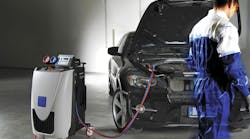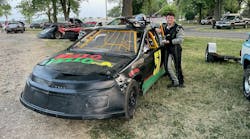WASHINGTON, D.C. — As the legislative session drew to a close, members of Congress backing new insurance regulations to prevent flooded and wrecked vehicles from being resold vowed to continue pushing for passage next year. Last week, Sen. Trent Lott (R-Miss.) and Rep. Cliff Stearns (R-Fla.) held a press conference about the proposed legislation attended by industry groups. Lott's bill (S-3707), the Consumer Access to Total Loss Vehicle Data Act, would provide information to consumers about vehicles declared a total loss by insurance companies. Stearns' legislation (H.R.-6093) calls for the National Highway Traffic Safety Administration to require the disclosure of all information pertaining to the fair market value and safety of damaged vehicles. The vehicle data could be shared through such online auto services as CAR-FAX. Totaled, flooded or stolen vehicles would be permanently "red-flagged" by insurers under the proposed legislation. Insurance companies would also be required to reveal the reason for the total loss, the date of the total loss, the odometer reading on that date, and whether or not the airbag deployed. Both bills grew out of concern that vehicles damaged during Hurricanes Katrina and Rita would be resold without complete disclosure of the damage they had incurred during the storms. It is estimated that some 500,000 automobiles were damaged by floodwaters in last year's hurricanes. "After Hurricane Katrina, I was approached by responsible auto dealers in Mississippi who were concerned about flooded vehicles ending up in the marketplace," Lott said. "An estimated half-million vehicles were damaged by Katrina, and indeed there is evidence that these cars are being cleaned up and sold to unsuspecting consumers. A number of these cars are unsafe and shouldn’t be on the roads. And folks are overpaying for vehicles they believe are mechanically sound. To the untrained eye, they appear to be in good shape." A group of insurance and automotive industry groups, however, are currently working on alternative legislation to present to Senator Lott that they say would be less onerous to industry. "The current bill would require us to set up an entirely new data collection and dissemination mechanism at our own expense," said Tom Litjen, vice president of federal government relations at the Property Casualty Insurers Association of America (PCI). "We're looking for ways to do that with less expense to the industry, and we're trying to work within the existing mechanisms to make that information available." PCI is working on the alternative legislation with the American Insurance Association and the Automotive Recyclers Association. Flood damage and corrosion can cause a number of problems, including malfunctioning airbags, and lead to the presence of blood-borne pathogens or mold in the car. "These flood vehicles end up in our repair facilities," said Bob Redding, Washington, D.C., representative for the Automotive Service Association (ASA), which supports the bills. "Vehicle owners bring these flood cars to our shops with very little information. Without the knowledge that these vehicles have been submerged, repairers may miss a critical piece of information — such as the airbag system — in their evaluation of the vehicle repair. The ability to identify these vehicles could save consumers repair expense, prevent injury or even loss of life as well as prevent long-term economic costs to consumers, repairers and insurers." Both Lott and Stearns plan to reintroduce the legislation next year. "The more consumers hear about the danger caused by rebuilt wrecks, the more they want Congress to do something about it," said David Regan, vice president of legislative affairs for the National Automobile Dealers Association (NADA). "With more than five million vehicles totaled by insurance companies just last year — more than half a million of them coming from the Gulf Hurricanes of 2005 — something has to be done to permanently notify consumers about these severely damaged vehicles." While auto repair industry associations have come out in favor of the bill, there are some issues to be resolved. Lott's bill does not define what a total loss is, for instance, and the insurance industry has indicated that building the database proposed in the legislation would be burdensome in terms of cost. The Automotive Recyclers Association (ARA) has also asked for clarification on the total loss issue, and suggested that the bill be altered so that damaged vehicles that should only be used for parts or scrap have their VINs and corresponding paperwork removed from the system to keep them off the road. According to Litjen, the information in the proposed database would not be complete. A vehicle with liability-only insurance (as opposed to collision insurance) could be totaled and rebuilt without that information ever being reflected on the title, for instance. "We don't control all salvaged vehicles," Litjen said. "There is, in fact, a great percentage of salvaged vehicles that we don't have information on. We don't want consumers to have a false sense of confidence in this database." |
Voice Your Opinion!
Voice Your Opinion!

